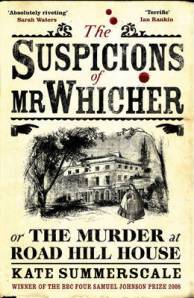We have, it would appear, always been fascinated with the darker side of human nature. Whether it be the many people who, up until the late 19th century, took daytrips to lunatic asylums to gawk at the patients, or the fact that I worked in bookshops for four years and True Crime was the biggest-selling section the entire time, there is something about the macabre that just keeps pulling in the punters.
One of the most sensational news stories of 1860 was the gruesome murder of a three-year-old boy, Saville Kent, at his home in Wiltshire. He was found in the outdoors privy suffocated, and with this throat cut. It was more or less immediately clear that the murderer must have been someone else in the house, either one of the Kent family, or one of their live-in servants. After some inept bumbling by the local police force, one of the relatively new London detectives was called in to help. The detective who was selected was Mr. Jonathan Whicher, who had enjoyed fast and heady success in the Met, and was trusted by those on high. He quickly decided that the culprit was the boy’s half-sister, Constance. But how to prove it?
home in Wiltshire. He was found in the outdoors privy suffocated, and with this throat cut. It was more or less immediately clear that the murderer must have been someone else in the house, either one of the Kent family, or one of their live-in servants. After some inept bumbling by the local police force, one of the relatively new London detectives was called in to help. The detective who was selected was Mr. Jonathan Whicher, who had enjoyed fast and heady success in the Met, and was trusted by those on high. He quickly decided that the culprit was the boy’s half-sister, Constance. But how to prove it?
The Suspicions of Mr. Whicher by Kate Summerscale wears a lot of hats: murder mystery, social history, biography of Mr. Whicher, survey of the fast-rising power of tabloid journalism. I couldn’t help thinking, though, that the book was ultimately a jack of all trades but master of none. It is indeed a very well written book, and the opinions and actions of the local and national press were among the most interesting aspects – no surprise when you consider that Summerscale was formerly the literary editor of The Daily Telegraph. I was frustrated by the section on sensation fiction, which the Kent murder undoubtedly inspired to some degree, but Summerscale seemed to suggest that without this case then sensation fiction would never have happened. I think that’s pushing it a bit, to be honest. And, as Catherine said in her review, she seems not to have read Lady Audley’s Secret – to which she makes repeated reference – terribly closely.
The book won The BBC Four Samuel Johnson Prize for Non-Fiction in 2008. Not having read any of the books it was up against, I have no idea whether it really was the best of the bunch, but I couldn’t help feeling a little disappointed by a book which I had been looking forward to for a long time.


Yes, she does seem to suggest that this case was responsible for the rise of the sensation novel. In actual fact, it was the newspaper reporting of such cases, rather than the Road Hill murder itself that influenced the genre. As you say, it’s her examination of the local and national press that is most interesting.
By: catherinepope on January 6, 2009
at 09:48